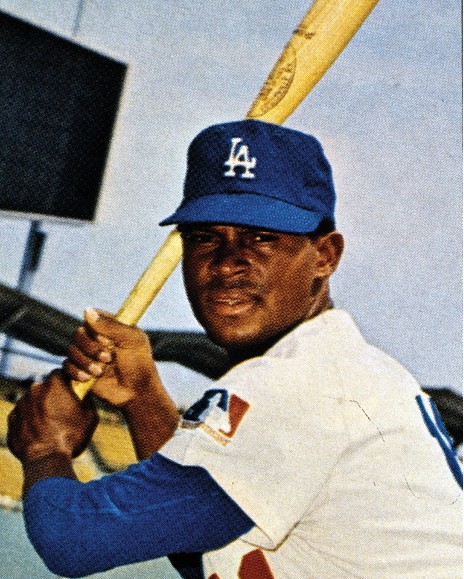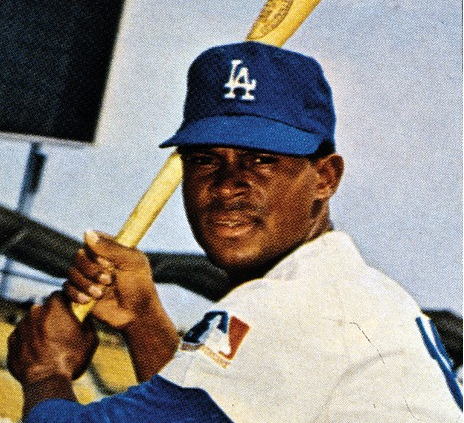October 5, 1980: Dodgers force NL West showdown against Astros

Outfielder Manny Mota played the last 13 years of his career as a Dodger and excelled as a pinch-hitter. (SABR-Rucker Archive)
Going into the final weekend of the 1980 season, both National League division races were yet to be decided. In the East, Mike Schmidt of the Philadelphia Phillies took care of business with one swing of the bat in an extra-inning game against the second-place Montreal Expos on the season’s final Saturday. Out West, the Los Angeles Dodgers were trailing the visiting Houston Astros by three games. Houston manager Bill Virdon’s hungry team needed to win one game to clinch the first pennant in their 19-year history. They were in first place for 102 days during the season but could not shake off the Dodgers, who never trailed Houston by more than 3½ games.
By early October it looked as though the Astros might finally pull away, having won 9 of 12 games going into the final series with the Dodgers. The Dodgers would have to sweep the series to keep their season alive and force a one-game playoff with Houston to decide the division title. Second baseman Joe Morgan, in his second tour with the Astros, provided the swagger by saying before the Friday opener, “There’s no way they can win four games in a row from us.”1 He ended up being right in the long run, but not before a near-epic collapse under the pressure of meaningful late-season baseball in the hostile confines of Dodger Stadium.
The series began with a Friday night game that ended on a line-drive home run hit by Joe Ferguson into the left-field pavilion on the first pitch of the bottom of the 10th inning, giving the Dodgers a come-from-behind 3-2 victory. Game two featured Dodgers lefty Jerry Reuss against Houston’s Nolan Ryan, whom the Astros had signed as a free agent in the offseason. This time it was All-Star Steve Garvey driving a Ryan fastball into the bleachers in the bottom of the fourth inning, giving the Dodgers a 2-1 lead that Reuss protected with a gutsy, complete-game victory.
The largest crowd of the season, 52,339, showed up to witness the final showdown. The Astros struck first, knocking out Dodgers starter Burt Hooton in the second inning, scoring two runs on three hits and an error committed by Hooton himself. Dodgers manager Tom Lasorda brought in long reliever Bobby Castillo, who grew up two miles from Dodger Stadium. He pitched out of a two-on, no-out jam with no further damage.
Astros starter Vern Ruhle gave way after yielding a leadoff single to Derrel Thomas (also a Los Angeles native) in the top of the third. Virdon summoned Joaquín Andújar, who blanked the Dodgers for two innings. Houston scored a run in the top of the fourth off Castillo on a two-out double by Terry Puhl, scoring Alan Ashby. The Astros led 3-0 after four innings.
Castillo put down the Astros in order in the top of the fifth, his fourth crucial inning of work. The Dodgers broke through in the bottom half off Andújar. With one out, Thomas, pinch-hitter Gary Thomasson, and leadoff hitter Davey Lopes hit consecutive singles leading to Los Angeles’ first run. Joe Sambito relieved Andújar and threw one pitch, which Mickey Hatcher hit into an inning-ending double play. The Astros had a 3-1 lead after five innings.
In the sixth inning, Lasorda brought in 19-year-old Fernando Valenzuela, who had yet to ignite the phenomenon known as Fernandomania. The young lefty coolly shut down the Astros over the next two innings. Sambito was ambushed by the lower part of the Dodgers order in the seventh. Singles by Pedro Guerrero and Ferguson and a bunt by Thomas put runners on second and third with one-out. Lasorda opted not to pinch-run for the slow-footed Ferguson even though he had speedy Rudy Law on the bench. He told reporters after the game, “If we had lost the game, I would have hung myself and you guys would have been the pall bearers.”2
Dodgers legend Manny Mota had retired after the 1979 season, his 18th in the big leagues and his 11th with the Dodgers. He spent 1980 as their first-base coach. With the season on the line, the coach became the player once more. He was activated for the September pennant chase.
Batting for Valenzuela, Mota worked the count to 2-and-2, then slapped a soft liner into short right field for the Dodgers’ second run. Guerrero scored, Ferguson went to third, and Mota took second on the throw. It was Mota’s 150th career pinch hit and the last of his long career.3
Frank LaCorte relieved Sambito and snuffed out the fire. Astros 3, Dodgers 2 after seven. Dodgers rookie reliever Steve Howe came on in the eighth inning. He got through the inning with no damage. Garvey led off the bottom of the eighth with a grounder to third that Enos Cabell could not handle and was safe at first on the error. This brought up wounded warrior Ron Cey. The stocky third baseman was asked to bunt Garvey to second. With a sore hamstring tightly taped, the nearly immobile Cey flailed at his two bunt attempts and was quickly down two strikes. A few pitches later, he had worked up a full count against the right-hander LaCorte. Cey fouled off three straight high fastballs, the first one off his front foot requiring a staggering, grimacing walk around the batter’s box before he stepped back in and fouled the next two straight back. Then, on the 10th pitch of the at-bat, LaCorte threw one a little lower in the zone and Cey launched it into the left-field pavilion for a 4-3 Dodgers lead.
As Cey limped around the bases, the Dodger Stadium crowd’s celebration rattled the ballpark. LaCorte was able to get through the rest of inning, and Howe went to the mound in the top of the ninth to close the game. He got the first out, but two singles and a groundout later put Astros on the corners with two outs and pinch-hitter deluxe Denny Walling coming to the plate.
Two stories offer insight on what happened next. In another unconventional move, Lasorda went to the mound with the season on the line, took out his young reliever and brought in the veteran Don Sutton. Sutton had pitched eight strong innings two days before and was not expecting to pitch in this game, being spared to start in Philadelphia should the Dodgers pull off the four-game sweep. Dodgers historian Mark Langill relates one version of the events: At some point in the game Sandy Koufax, of all people, went looking for Sutton and found him in the clubhouse relaxing and about to imbibe in a glass of wine. Before Sutton drank, Koufax suggested that he refrain and stay loose in case he was needed in a pinch.4Another report indicates it was the injured Reggie Smith, not able to play, who suggested to Lasorda that Sutton stay ready. Either way, the 35-year-old owner of 230 career Dodgers victories and exactly four career saves was ready in the bullpen when Lasorda needed him.5
It took two pitches to induce Walling into a game-ending groundout and unleash utter pandemonium at Chavez Ravine. The Dodgers had done what they needed to do; they swept the Astros three straight and forced the fifth season-ending tiebreaker in National League history. At Anaheim Stadium that afternoon, where the Los Angeles Rams were trouncing the San Francisco 49ers, the game had to be stopped three times because of crowd noise. Fans listening to Vin Scully broadcast the Dodgers game on radio were roaring so loudly that the quarterback could not be heard calling plays on the field.6
Sutton, who had also pulled a stint as first-base coach when Mota came into the game, said, “It’s about time I slammed the door, after all the times they’ve done it for me.”7 The 1980 National League ERA leader would be a free agent after the season, ending his 15-year run with the Dodgers on a very high note.8
It turned out to be an anticlimactic high note. The next day, in the Los Angeles sun and smog and in front of another huge crowd, Dodgers starter Dave Goltz was shelled early, and despite more stellar relief from the young trio of Castillo, Valenzuela, and Howe, Astros knuckleballer Joe Niekro shut down the Dodgers lineup – minus Cey – for his 20th win of the season. The Astros were not, in fact, beaten four times in a row by “that team” as Joe Morgan predicted. Instead Houston ended the 163-game 1980 regular baseball season with a very quiet 7-1 defeat of the Dodgers.9
Author’s Note
I was at the first of these three games (October 3) and I can attest to how exciting they were. I credit that series, along with the advent of the new full-color video scoreboard (Diamond Vision, unveiled at the 1980 All-Star Game), with creating an entirely new fan experience at Dodger Stadium that has only gotten better over the years.
Sources
In addition to the sources cited in the Notes, the author consulted Baseball-Reference.com and Retrosheet.org.
https://www.baseball-reference.com/boxes/LAN/LAN198010050.shtml
https://www.retrosheet.org/boxesetc/1980/B10050LAN1980.htm
Notes
1 Gordon Verrell, “Astros Escape Dodger Clutches in Playoff,” The Sporting News, October 18, 1980: 35.
2 David Leon Moore, “Another Day, Another Dodger Miracle,” San Bernardino (California) Sun, October 6, 1980: C4.
3 Mota had previously broken Smoky Burgess’s pinch-hit record on September 28, 1979, with his 146th career pinch hit. Mota’s final record of 150 pinch hits was surpassed by Lenny Harris of the New York Mets on October 6, 2001. (Harris finished his career with 212 pinch hits.)
4 Ron Cey (host), “We’ll See About That with Ron Cey,” Podcast Episode 21 Mark Langill, March 28, 2023. https://wewillseeaboutthatcey.blogspot.com/2023/03/blog-post.html.
5 David Leon Moore, “Thanks to Sutton, L.A. Breathes Sigh of Relief,” San Bernardino Sun, October 6, 1980: C4.
6 Paul Oberjuerge, “Powerhouse Rams Blow Away 49ers, 48-26,” San Bernardino Sun, October 6, 1980: C4.
7 Moore, “Thanks to Sutton, L.A. Breathes Sigh of Relief.”
8 Sutton returned to the Dodgers in 1988. He won three games and lost six for the eventual World Series champions before being released on August 10.
9 The Philadelphia Phillies beat the Astros in the best-of-five National League Championship Series.
Additional Stats
Los Angeles Dodgers 4
Houston Astros 3
Dodger Stadium
Los Angeles, CA
Box Score + PBP:
Corrections? Additions?
If you can help us improve this game story, contact us.


